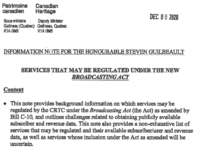Google, which did not appear before the Standing Committee on Canadian Heritage as part of its study on Bill C-10 (neither did TikTok, Facebook or other big tech companies with the exception of Netflix), has spoken out over concerns with Bill C-10. The post warns of the “possible unintended consequences that could negatively and unnecessarily impact” both creators and Canadian Youtube users. The company is particularly concerned with the discoverability requirements that have been expanded to include user generated content:
Post Tagged with: "broadcasting act"
Liberals, NDP and Bloc Vote Down User Generated Content Safeguards as MPs Defend Deeply Flawed Bill C-10 Committee Study
The Standing Committee on Canadian Heritage continued its clause-by-clause review of Bill C-10 yesterday, spending the full two hours debating a Conservative amendment that would have restored the user generated content safeguards that were removed when Section 4.1 was dropped from the bill. The Conservative amendment effectively offered the parties a “do-over” by acknowledging that the removal had sparked huge public concern over the implications for freedom of expression and net neutrality. Nevertheless, the Liberals, NDP, and Bloc voted down the motion, with the NDP not even bothering to speak to the issue at all.
While the three parties were not supportive of addressing the user generated content concerns, they were quick to defend any suggestions that the study of Bill C-10 had been flawed and excluded important voices. For example, when Conservative MP Rachael Harder began reading comments from Scott Benzie on the harms to digital-first Canadian creators who did not appear before the committee (citing the likes of Lily Singh, Molly Burke and thousands more), Liberal MP Anthony Housefather jumped in with a “point of clarification” that the Conservatives could have invited Benzie as a witness (he said the same to me in a Twitter exchange). Bloc MP Martin Champoux also took issue with suggestions that the consultation had been incomplete, stating that there had been 121 witnesses.
The Law Bytes Podcast, Episode 90: Fenwick McKelvey on Bill C-10, Discoverability and the Missing Representation of a New Generation of Canadian Creators
Weeks into a high profile debate over Bill C-10, the issue of discoverability of Canadian content has emerged as a policy tug of war between supporters that want the CRTC to intervene by mandating the discoverability of Canadian content on sites such as Youtube and Tiktok and critics that argue the approach would raise significant freedom of expression and net neutrality concerns.
But what exactly is “discoverability” and how would it impact both users and the thousands of Canadian creators that have already found success on digital platforms?
Fenwick McKelvey is a communications professor at Concordia University who has written more about the discoverability and algorithmic media than anyone in Canada. He has regularly participated in CRTC hearings and was the co-author of a leading study on the issue commissioned by Canadian Heritage. He joins the Law Bytes podcast to talk about discoverability, his frustrations with its implementation in Bill C-10, and the potential consequences for Canadian creators.
Not Just Big Tech: Government Memo Shows Bill C-10 Targets News Sites, Podcast and Workout Apps, Adult Websites, Audiobooks, and Sports Streamers for CRTC Regulation
Canadian Heritage Minister Steven Guilbeault has tried to deflect public concern with the regulation of user generated content under Bill C-10 by claiming the intent is to make the “web giants” pay their fair share. Yet according to an internal government memo to Guilbeault signed by former Heritage Deputy Minister Hélène Laurendeau released under the Access to Information Act, the department has for months envisioned a far broader regulatory reach. The memo identifies a wide range of targets, including podcast apps such as Stitcher and Pocket Casts, audiobook services such as Audible, home workout apps, adult websites, sports streaming services such as MLB.TV and DAZN, niche video services such as Britbox, and even news sites such as the BBC and CPAC.
The regulations would bring the full power of CRTC regulation over these sites and services. This includes requiring CRTC registration, disclosure of financial and viewership data, Canadian content discoverability requirements (yes, that could mean Canadian discoverability for pornography services), and mandated payments to support Canadian film, television, and music production. The list also notably identifies potential regulation of Youtube Music, Snapchat Originals, and other social media services whose supposed exclusion has been cited as the rationale to extend regulation to user generated content.
The Law Bytes Podcast, Episode 89: Debating Bill C-10 at the Canadian Heritage Committee, Part Two: A Special Law Bytes Podcast
With yesterday’s Standing Committee on Canadian Heritage meeting with experts on Bill C-10 and its implications for freedom of expression, this is a special Law Bytes episode featuring my opening statement and engagement with Members of Parliament. The discussion canvassed a wide range of issues including how regulating user generated content makes Canada an outlier worldwide, the impact on net neutrality, and why discoverability requirements constitute speech regulation. There is a second post that features my opening statement to the committee.











